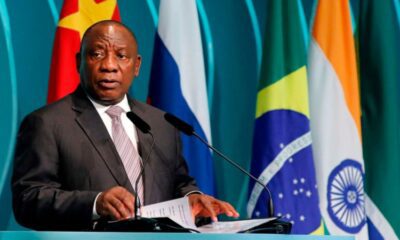National Issues
A leadership’s empathy deficit

One of the ways of effectively illustrating profound and divine truths is through parables. Little wonder Jesus favoured this narrative mode. He utilized earthly stories, which his listeners could relate to, as a means of establishing divine truths. All through his earthly ministry, it is recorded that he told a total of 46 parables, each imbued with bold characters, rich symbolism, and conveying a single, simple but powerful message.
The parable of the Good Samaritan is one of the most popular, possibly because it provides an ethical level that we should aspire to reach. It also attacks racial (and in the Nigerian context that can easily be replaced with tribal) prejudices, and teaches us the essence of compassion.
Power is a significant element of leadership. How it is utilized, either in a formal or personal context, can determine the success of a leader. The most common mistake leaders make, especially those in political positions, is to see power a convenient means to a self-serving end. A leader who continuously relies on such a means for purposes of self-aggrandisement, soon ignores all established rules including those of decency. He sees only one rule and willingly applies it in all circumstances and willing applies it to all circumstances. That rule is the power available to him. This type of misuse of power has inevitably created the notion that power tends to corrupt, and the basis for the well-known maxim courtesy of the 19th century British historian, Lord Acton, that “Absolute power corrupts absolutely”.
It has taken almost two centuries for empirical validation of Acton’s astute observation along the corridors of power. In 2013, researchers concluded that power can diminish a person’s capacity for empathy, because a sense of power shuts down a part of the brain that helps us connect with others. What this implies in the context of leadership is that empathy is necessary to curtail the misuse of power.
Two days ago, it was the 100th day since the schoolgirls were abducted in Chibok, Borno State. That disastrous incident, which has become a source of international attention for the country, is also an unexpected means of appraising the country’s leadership. Kidnappings, especially in the context of terrorism, are no longer unusual because of their frequency as serve a number of purposes for the terrorists. Consequently countries that have experienced such situations have been able to develop methodologies of engagement. A common thread that runs through most of the past experiences, has been placing prime value on the lives of the hostages. As a result the once favoured strategy of using force has become less considered in the light of the negative outcomes. What has steadily become the preferred approach is negotiation in the context of a swap, a pragmatic strategy that highlights the importance placed on the safety of the captives.
In keeping with this approach that underscores the human value of a citizen’s life, the United States of America had to put aside its well publicised stance of not negotiating with terrorists. Terrorists don’t come any worse than the Talibans, whose mean methods are anything but maniacal. Yet on May 31, this year, Sergeant Bowe Bergdahl who had been held captive since June 30, 2009, was released in exchange for five high ranking Talibans. Mohammed Fard, Khairulla Khairkhwa, Abdul Haq Wasiq, Norullah Norri and Mohammed Nabi Omari, had been detained by the Americans at Guantanamo Bay. The five had been the Taliban Army Chief of Staff, Deputy Minister of Intelligence, and Taliban Interior Minister. The other two were senior Taliban figures.
From all indications the prisoner swap was brokered by the American, Qatar and Afghanistan administrations with the Talibans. Part of President Obama’s statement, after Bergdahl’s release reads: “Today the American people are pleased that we will be able to welcome home Sergeant Bowe Bergdahl, held captive for nearly five. On behalf of the American people, I was honoured to call his parents to express our joy that they can expect his safe return, mindful of their courage and sacrifice throughout his ordeal….And as we find relief in Bowe’s recovery, our thoughts and prayers are with those other Americans whose release we continue to pursue.”
The manner in which Bergdahl’s release was secured, contrary to the usual American public posturing, gives reason to believe that the other Americans in captivity will also gain their freedom. But it also sends strong signals of a realistic rescue operation that would be some source of comfort for the families of those still in captivity. They would feel the balm of the pragmatic approach.
The Obama pragmatism shows an emphasis on compassion. As someone has rightly mentioned, empathy is putting yourself in another person’s shoes. Obama forsook the lure of wielding power for the sensible possibilities of empathy. That enabled him to be in the shoes of Berghdahl, to feel the pains of the American citizen in the captivity of the Talibans. Obama also placed himself in the shoes of Berghdahl’s parents, to feel the hollowness in their hearts created by their son’s long absence.
The handling of the Chibok schoolgirls’ abduction has shown, as never before, the disconnect between the privileged leadership and the hapless followership, especially those located far from the vicinity of authority. It has also shown the empathy deficit of Nigeria’s leadership especially for those not in the ruling class. Within a few hours of the Kogi State Governor losing his father some weeks ago, the Presidency sent the Vice President on a condolence visit. When the Vice President lost his junior brother in a fatal crash, governance virtually came to a standstill in the nation’s capital as a mark of honour.
Ossified by the power at its disposal, the leadership failed to utilize every plausible opportunity to show itself as genuinely caring to the Chibok community. It ignored the Citizens’ Solutions offered to it by the #BringBackOurGirls movement which suggested a holistic approach, including connecting directly with the Chibok community, providing sustainable interventions for victims, and taking essential measures to counter the growing insurgency.
Instead, it kept looking for opportunities to male political capital. Hence even when it did not want to be seen as using ideas honestly proffered by its ciitziens, it could not come up with suitable alternatives until foreigners intervened. It took three American Congresswomen for the leadership to buy into the Victims Support Fund.
History will also record that the administration, through its American PR firm, Levick, sought to hijack the Malala Yousafzai visit purely for political mileage. The visit was solely planned between the Malala Foundation and the #BringBackOurGirls campaigners to mark the 90th day of the Chibok abduction, as a reminder for the girls’ ordeals at the hands of their captors to be terminated as quickly as possible. Levick treacherously reached out to the Malala Foundation’s Director of Operations, a fellow American, to get Malala to suggest to Jonathan a meeting with the Chibok victims who had come to Abuja. This was in fulfillment of the image laundering contract.
When the meeting failed to hold, the vituperations from the Presidency further underscored its pain at losing an image laundering photo opportunity. When photo opportunities, in times of tragedy, become the premium over the worth of human lives, that should tell us that something has gone terribly wrong with governance in our country. It also exposes the hypocrisy of the administration’s transformation slogan. Transformation starts from the heart, the citadel of compassion. A heart devoid of compassion cannot show empathy when it matters. It is not empathy when an exalted position makes it difficult for a leadership to understand universally accepted norms of connecting with the followership, without looking for political capital, especially in times of loss and sorrow.
It is not empathy when an administration contracts Levick to change established narratives of an insurgency, of a well-known massive abduction, or of a legitimate outcry by concerned citizens for those constitutionally charged with the nation’s security to live up to the their oath of office.
It is not empathy when security operatives resort to the falsehood in framing up citizens’ interventions as a franchise of terrorists, simply because they have the courage to call for accountability.
As a new phase begins in the quest for the rescue of the 219 schoolgirls from their maniacal abductors, the administration must go beyond the facile assurances of the past 100 days. Each day that passes without tangible information about the rescue operation only heaps more sorrow on the parents, which the Villa visit cannot assuage. Each day the girls remain as captives, they become more vulnerable to violations, while it underscores the leadership’s empathy deficit. May their fate not be some kind of parable about leadership in Nigeria.




















